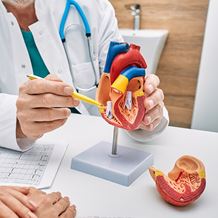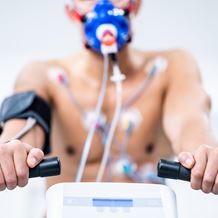What is a nuclear cardiology imaging?
Nuclear cardiology imaging is a type of test that uses a small amount of safe radioactive substance to safely take pictures of your heart. These images are used to assess your heart function and help diagnose potential heart disease.
Nuclear cardiology imaging is often referred to as a nuclear stress test. It is very similar to an exercise stress test, but instead of using an echocardiogram to produce images of the heart, nuclear stress testing uses a radioactive dye. This produces highly detailed pictures of the heart muscle and blood flow, both before and after stress. It is considered highly accurate in diagnosing and monitoring coronary heart disease.
How does it work?
Nuclear cardiology imaging can be performed using physical exercise or medication to simulate the effects of activity on the heart. Firstly, the radioactive substance is injected into a vein. This is known as a tracer, and as it enters the bloodstream it is absorbed by the heart and blood vessels which makes them more visible. A special camera is then used to take pictures of the heart at rest. The second stage of the test uses a bike, treadmill or medication (such as dobutamine) to increase the heartrate and assess how the heart responds to stress. Further pictures are taken until the test is complete.
Why do I need it?
If you have been experiencing heart-related symptoms such as chest pain, dizziness, irregular heartbeat (arrhythmia) or shortness of breath, your doctor may recommend nuclear cardiology imaging to find out what may be causing the symptoms. This type of testing is considered highly accurate and is commonly used to diagnose and monitor coronary heart disease, a condition that occurs when the arteries become narrow or blocked.
What does it test for? What does it show?
Nuclear stress testing tells us useful information about how your heart behaves under stress, and how effectively it pumps blood around your body. The test can also locate any blocked arteries or heart damage and show where there are areas of poor blood flow. These factors all help diagnose and screen for coronary heart disease. Nuclear cardiology imaging can indicate how well any heart treatment is working, as well as show any damage from previous cardiac events such as a heart attack. Nuclear stress testing is also a highly effective way to test suitability for heart surgery or a return to exercise.
What's next?
If you have been experiencing heart-related symptoms, book an appointment with our cardiac services specialist today.
Our specialists in Cardiac Services
View all specialists






